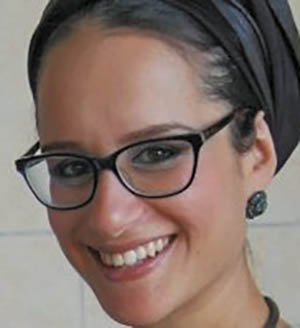

I travel to Israel on business for my law firm a couple of times a year.
Last year, I arrived in Tel Aviv two days before a graduation at Machon Lustig in Bnei Brak. Machon Lustig is the women’s division of Jerusalem College of Technology (JCT), and is geared towards educating Haredi women in business, computers and technology. I have been on the board of JCT for a number of years but I had never visited the Bnei Brak campus. I was blown away.
That night, in the basement auditorium of a school in B’nei Brak, approximately 20–25 women obtained graduate degrees in computer science. With few exceptions, their husbands, their parents and their children were there beaming proudly, cheering these graduates on. On the dais with me, along with C-suite types from industry (Israel Aerospace, First International Bank of Israel etc.), were also two women who had graduated from Machon Lustig: Malkie Eichenstein, who is currently a partner in PriceWaterhouse, and Hadassa Rosenberg, who is the CFO of Keren Hagshama, a money management firm. Similar to the graduates, their husbands are rabbis who head kollels or have their own congregations. Both Mrs. Eichenstein and Mrs. Rosenberg are highly successful professionals and spoke enthusiastically of being able to juggle their religious obligations, their careers and their family responsibilities in a society that has increasingly begun to accept and appreciate the ability of these women to work in high-paying professions yet maintain their identities.
To me, the scene was mind-boggling and, despite my familiarity with the school, upended all my preconceptions and certain prejudices about the status of Haredi women in Israeli society.
It is nothing short of a silent revolution.
I do not believe it is an exaggeration to say that Haredi women are leading the way out of a cycle of poverty in their communities, and at the same time helping to grow the startup nation.
Over the past few years, thousands of members of the Haredi community have integrated into the demanding hi-tech field. Two-thirds of Haredi employees in the field are women. “The Haredi women are responsible for the impressive growth of manpower in hi-tech,” says Shaindy Babad, CEO of Temech—the Haredi body that deals with the training and integration of Haredi women within the workforce.
According to Rabbi Dr. Tzvi Ilani, Head of Lustig Campus, “One of the testaments of the revolution in the Haredi sector is that where once an excelling Yeshiva student would want to settle down with a teacher, now he looks for someone who can make a living, including in technological fields.”
JCT’s Haredi graduates comprise a significant number of female Haredi graduates and students in the hi-tech field. Eight hundred Haredi women completed certification and degree studies in hi-tech in 2015, 23 percent are graduates of JCT and 3,000 women are currently studying towards certification in hi-tech; close to 20 percent of those are studying at JCT. The main difference between JCT graduates and the other Haredi graduates mentioned is that where many of the Haredi women studying participate in certification programs, all students who graduate from JCT do so with a full BSc degree in the field.
Malka Segev, a graduate of Lustig Campus (JCT’s campus for Haredi women) works for Realcommerce, where she manages the sales division. Ms. Segev, a mother of three and married to an Avrech, is one of two Haredi women employed by the company, which has 150 employees. She admits, “It’s hard to get hired, but once you’re there, they accept you as you are; they will be considerate and will promote you as they would anyone else.”
Despite the reported difficulties, there are still plenty of employers who purposely seek out Haredi employees. Tomer Nussbaum, Vice CEO of Unilink, states, “Their work ethic is extremely high. After three months of maternity leave, they return immediately, unlike those in the secular community who sometimes extend the leave to four to six months, especially with the first child.”
Maxine Fassberg, CEO of Intel Israel, stated during a FemTech seminar held by Lustig Campus in Ramat Gan: “We want the Haredi sector in our company and we want it in the workforce. Without integrating all sectors of Israeli society, Israel has no chance to be anything more than an unsuccessful country.”
My takeaway from speaking to our Israeli clients—with whom I discussed this graduation at length—was that Israeli companies were eager to hire Haredi women (and men). Haredi women, regardless of age, constitute a goal-oriented, mature work force that, despite some constraints relating to religious observance, is ready to produce and add real value to any company.
Aurora Cassirer is a partner at the law firm of Troutman Sanders, LLP and practices in its New York office.
By Aurora Cassirer











